外研版(2019)必修 第一册Unit 2 Exploring EnglishUnderstanding ideas—读思·发展思维品质PPT(共71张PPT)
文档属性
| 名称 | 外研版(2019)必修 第一册Unit 2 Exploring EnglishUnderstanding ideas—读思·发展思维品质PPT(共71张PPT) | 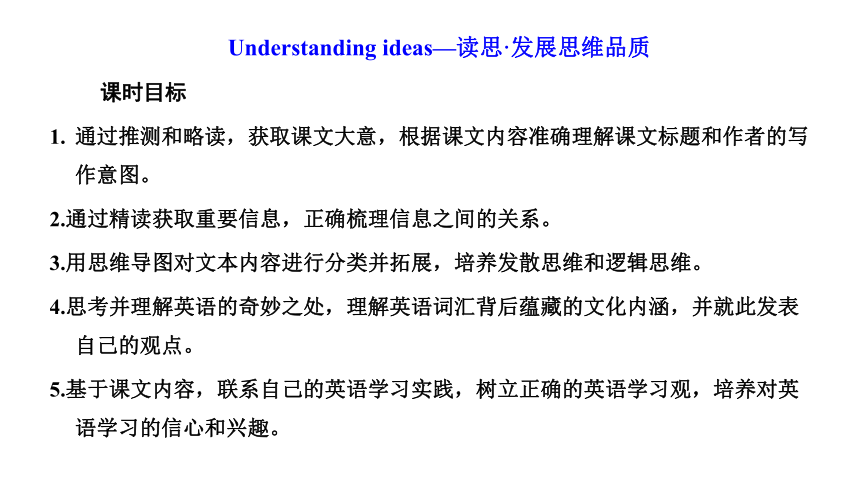 | |
| 格式 | zip | ||
| 文件大小 | 1.1MB | ||
| 资源类型 | 教案 | ||
| 版本资源 | 外研版(2019) | ||
| 科目 | 英语 | ||
| 更新时间 | 2022-12-14 08:01:45 | ||
图片预览

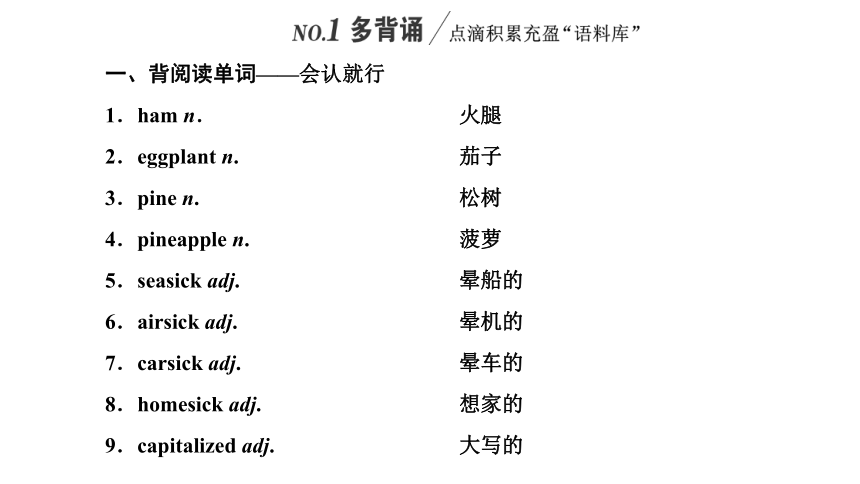
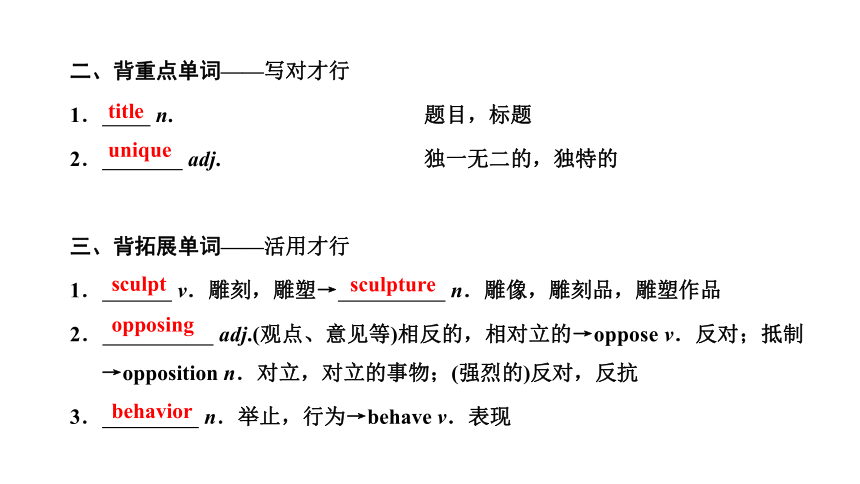
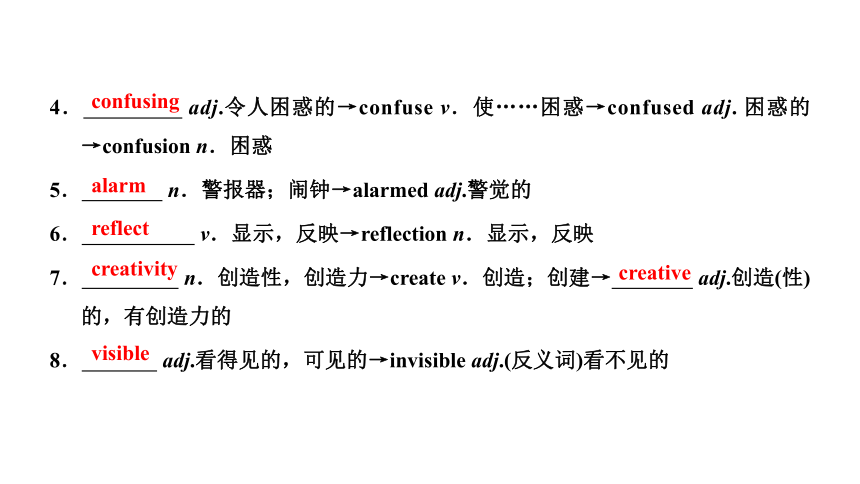
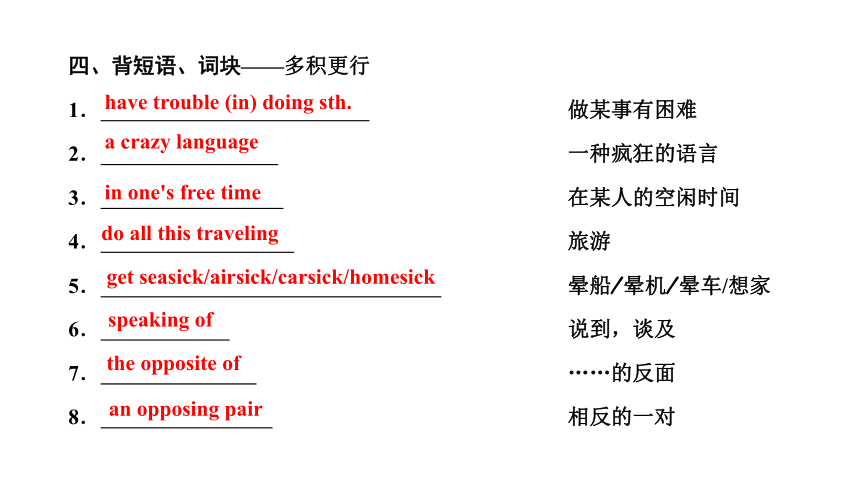
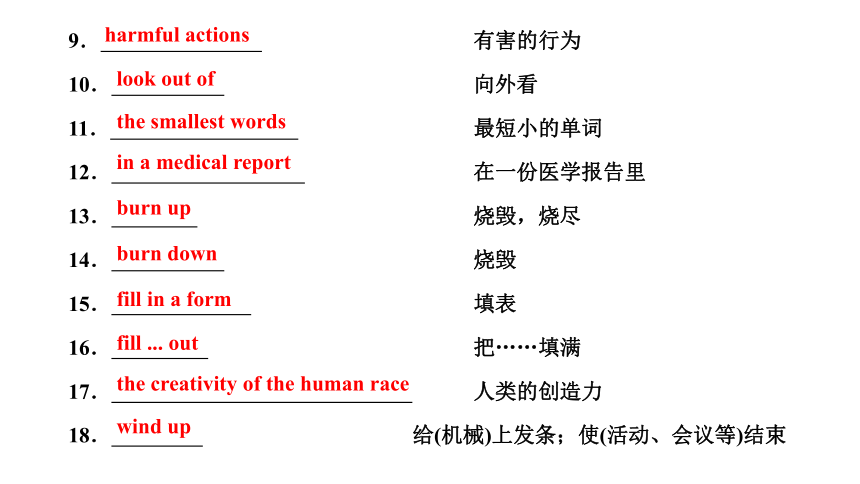
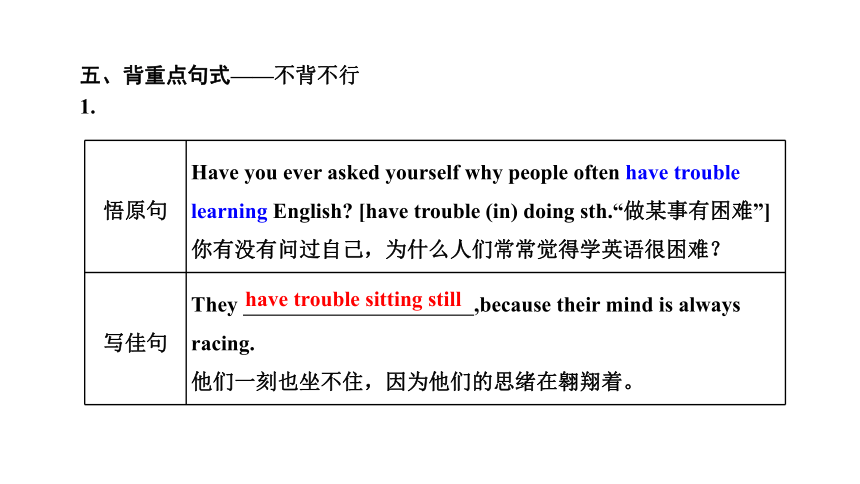
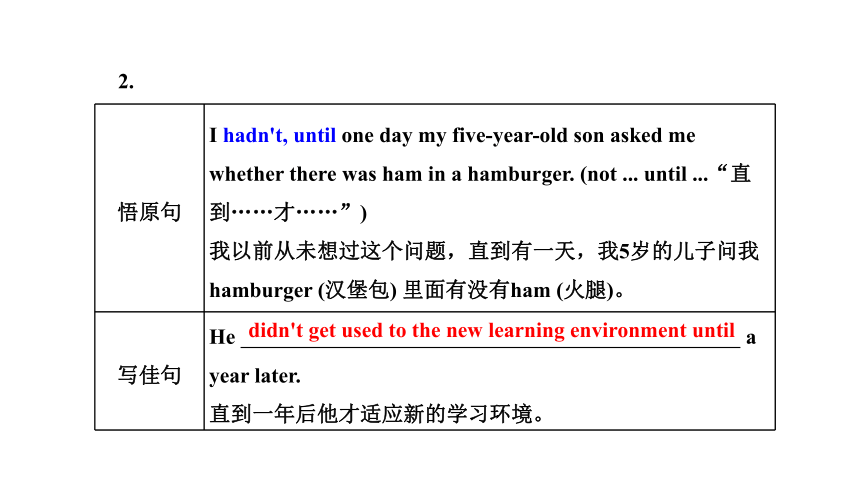
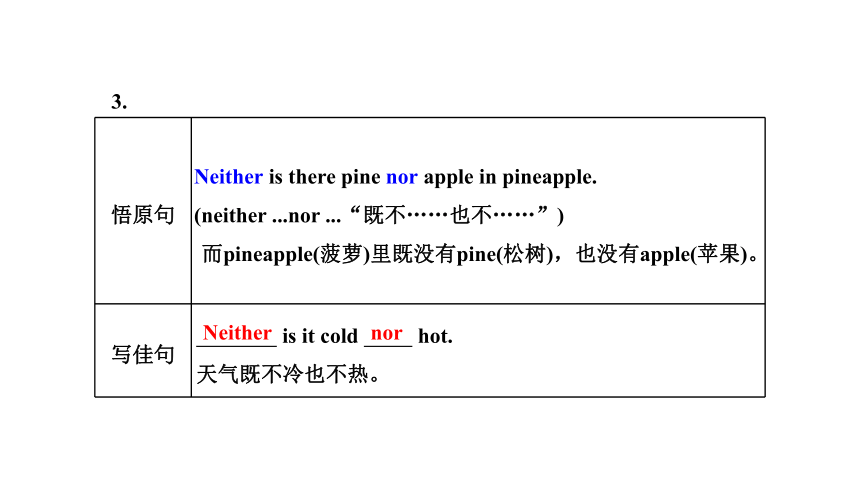
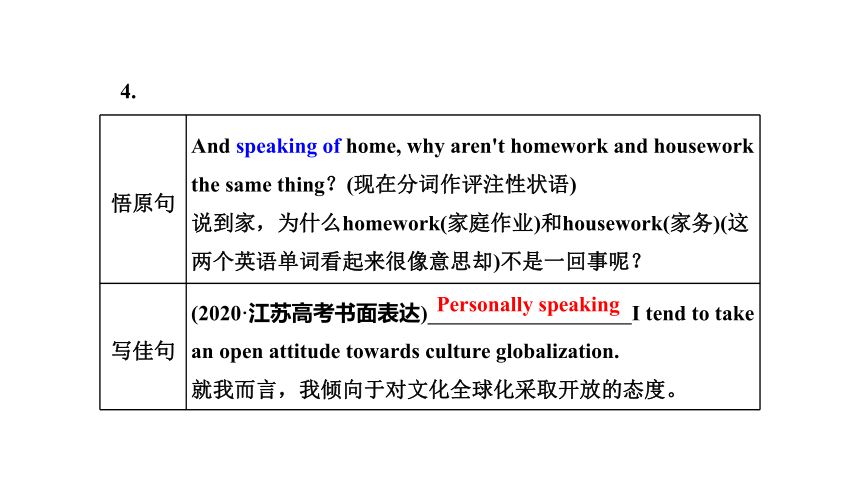
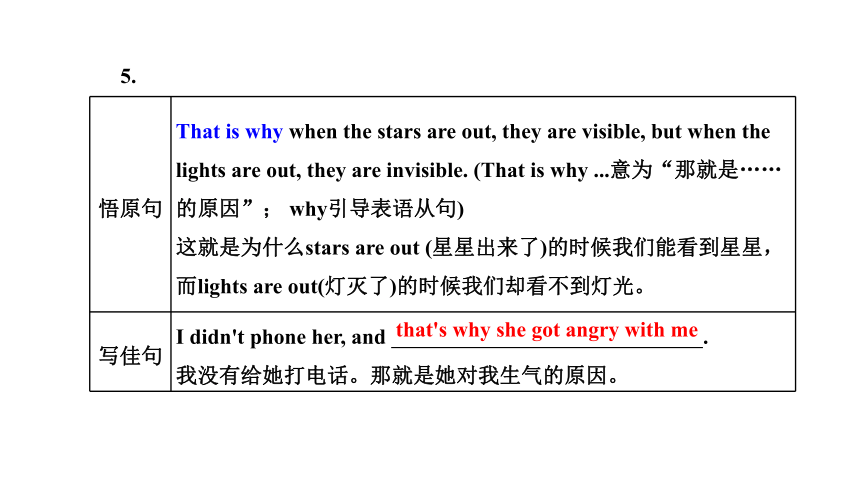
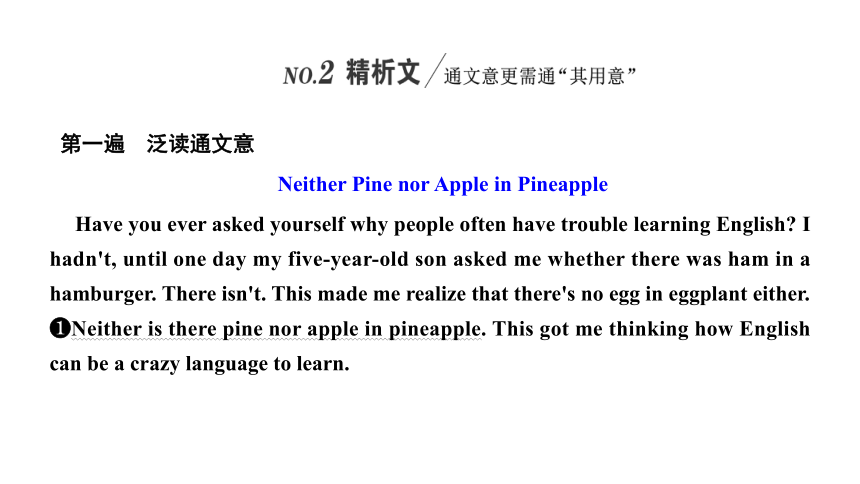
文档简介
(共71张PPT)
Understanding ideas—读思·发展思维品质
课时目标
1. 通过推测和略读,获取课文大意,根据课文内容准确理解课文标题和作者的写作意图。
2.通过精读获取重要信息,正确梳理信息之间的关系。
3.用思维导图对文本内容进行分类并拓展,培养发散思维和逻辑思维。
4.思考并理解英语的奇妙之处,理解英语词汇背后蕴藏的文化内涵,并就此发表自己的观点。
5.基于课文内容,联系自己的英语学习实践,树立正确的英语学习观,培养对英语学习的信心和兴趣。
一、背阅读单词——会认就行
1.ham n. 火腿
2.eggplant n. 茄子
3.pine n. 松树
4.pineapple n. 菠萝
5.seasick adj. 晕船的
6.airsick adj. 晕机的
7.carsick adj. 晕车的
8.homesick adj. 想家的
9.capitalized adj. 大写的
二、背重点单词——写对才行
1. n. 题目,标题
2. adj. 独一无二的,独特的
三、背拓展单词——活用才行
1. v.雕刻,雕塑→ n.雕像,雕刻品,雕塑作品
2. adj.(观点、意见等)相反的,相对立的→oppose v.反对;抵制→opposition n.对立,对立的事物;(强烈的)反对,反抗
3. n.举止,行为→behave v.表现
title
unique
sculpt
sculpture
opposing
behavior
4. adj.令人困惑的→confuse v.使……困惑→confused adj. 困惑的→confusion n.困惑
5. n.警报器;闹钟→alarmed adj.警觉的
6. v.显示,反映→reflection n.显示,反映
7. n.创造性,创造力→create v.创造;创建→ adj.创造(性)的,有创造力的
8. adj.看得见的,可见的→invisible adj.(反义词)看不见的
confusing
alarm
reflect
creativity
creative
visible
四、背短语、词块——多积更行
1. 做某事有困难
2. 一种疯狂的语言
3. 在某人的空闲时间
4. 旅游
5. 晕船/晕机/晕车/想家
6. 说到,谈及
7. ……的反面
8. 相反的一对
have trouble (in) doing sth.
a crazy language
in one's free time
do all this traveling
get seasick/airsick/carsick/homesick
speaking of
the opposite of
an opposing pair
9. 有害的行为
10. 向外看
11. 最短小的单词
12. 在一份医学报告里
13. 烧毁,烧尽
14. 烧毁
15. 填表
16. 把……填满
17. 人类的创造力
18. 给(机械)上发条;使(活动、会议等)结束
harmful actions
look out of
the smallest words
in a medical report
burn up
burn down
fill in a form
fill ... out
the creativity of the human race
wind up
五、背重点句式——不背不行
1.
悟原句 Have you ever asked yourself why people often have trouble learning English [have trouble (in) doing sth.“做某事有困难”]
你有没有问过自己,为什么人们常常觉得学英语很困难?
写佳句 They ,because their mind is always racing.
他们一刻也坐不住,因为他们的思绪在翱翔着。
have trouble sitting still
2.
悟原句 I hadn't, until one day my five-year-old son asked me whether there was ham in a hamburger. (not ... until ...“直到……才……”)
我以前从未想过这个问题,直到有一天,我5岁的儿子问我hamburger (汉堡包) 里面有没有ham (火腿)。
写佳句 He a year later.
直到一年后他才适应新的学习环境。
didn't get used to the new learning environment until
3.
悟原句 Neither is there pine nor apple in pineapple. (neither ...nor ...“既不……也不……”)
而pineapple(菠萝)里既没有pine(松树),也没有apple(苹果)。
写佳句 is it cold hot.
天气既不冷也不热。
Neither
nor
4.
悟原句 And speaking of home, why aren't homework and housework the same thing?(现在分词作评注性状语)
说到家,为什么homework(家庭作业)和housework(家务)(这两个英语单词看起来很像意思却)不是一回事呢?
写佳句 (2020·江苏高考书面表达) I tend to take an open attitude towards culture globalization.
就我而言,我倾向于对文化全球化采取开放的态度。
Personally speaking
5.
悟原句 That is why when the stars are out, they are visible, but when the lights are out, they are invisible. (That is why ...意为“那就是……的原因”; why引导表语从句)
这就是为什么stars are out (星星出来了)的时候我们能看到星星,而lights are out(灯灭了)的时候我们却看不到灯光。
写佳句 I didn't phone her, and .
我没有给她打电话。那就是她对我生气的原因。
that's why she got angry with me
第一遍 泛读通文意
Neither Pine nor Apple in Pineapple
Have you ever asked yourself why people often have trouble learning English I hadn't, until one day my five-year-old son asked me whether there was ham in a hamburger. There isn't. This made me realize that there's no egg in eggplant either. Neither is there pine nor apple in pineapple. This got me thinking how English can be a crazy language to learn.
For example, in our free time we can sculpt a sculpture and paint a painting, but we take a photo. And when we are traveling we say that we are in the car or the taxi, but on the train or bus! While we're doing all this traveling, we can get seasick at sea, airsick in the air and carsick in a car, but we don't get homesick when we get back home. And speaking of home, why aren't homework and housework the same thing
If “hard” is the opposite of “soft”, why are “hardly” and “softly” not an opposing pair If harmless actions are the opposite of harmful actions, why are shameless and shameful behaviors the same
When we look out of the window and see rain or snow, we can say “it's raining” or “it's snowing”. But when we see sunshine, we can't say “it's sunshining”.
Even the smallest words can be confusing. When you see the capitalized “WHO” in a medical report, do you read it as the “who” in “Who's that?” What about “IT” and “US”?
You also have to wonder at the unique madness of a language in which a house can burn up as it burns down, in which you fill in a form by filling it out, and in which an alarm is only heard once it goes off!
English was invented by people, not computers, and it reflects the creativity of the human race. That is why when the stars are out, they are visible, but when the lights are out, they are invisible. And that is why when I wind up my watch, it starts, but when I wind up this passage, it ends.
[参考译文]
菠萝≠松树+苹果
你有没有问过自己,为什么人们常常觉得学英语很困难?我以前从未想过这个问题,直到有一天,我5岁的儿子问我hamburger(汉堡包)里面有没有ham(火腿)。答案是没有。这让我意识到,eggplant(茄子)里面也没有egg(鸡蛋),而pineapple(菠萝)里既没有pine(松树),也没有apple(苹果)。这让我陷入思考:对于学习者而言,英语到底可以有多疯狂呢?
[句式释解]
句 neither ...nor ...“既不……也不……”,为并列连词,连接两个平行并列的成分。此处连接两个并列的主语,谓语动词应采用“就近一致”原则。neither位于句首时,句子用部分倒装。
例如,闲暇时我们可以雕一座雕像(sculpt a sculpture)、画一幅画(paint a painting),但只能拍一张照片(take a photo)。旅行时,我们坐汽车或出租车时是说坐在里面(in),坐火车或公共汽车时却要说坐在上面(on)!同样,我们会在海上晕船(seasick at sea)、在飞机里晕机(airsick in the air)、在车里晕车(carsick in a car),但回到家里我们却不会“晕家”(homesick,实际意义为“思乡的”)。说到家,为什么homework(家庭作业)和housework(家务)(这两个英语单词看起来很像意思却)不是一回事呢?
[句式释解]
句 while引导时间状语从句,意为“当……的时候”。
如果说hard(硬)是soft(软)的反义词,为什么hardly(几乎不)和softly(柔和地)却不是一对反义词?如果说harmless actions(无害行为)和harmful actions(有害行为)意思相反,为什么shameless behaviors(无耻行为)和shameful behaviors(可耻行为)反而是一回事?
当我们望向窗外,看到雨(rain)或雪(snow)时,我们可以说正在下雨(it's raining)或正在下雪(it's snowing)。可我们看见阳光(sunshine)的时候却不能说“正在下阳光”(it's sunshining)。
就算是最短小的单词都让人费解。如果你在医学报告中看到大写的WHO,你会把它读成Who's that?中的who吗?那么IT和US又该怎么读呢?
[句式释解]
句 What/How about (doing) sth.?“(做)某事怎么样?”该句式表示征询意见,或用于提出建议。
英语这门语言独有的疯狂令你不得不感到惊奇。在英语里,房子烧成灰烬的时候,可以说burn up(字面意思为“烧上去”),也可以说burn down(字面意思为“烧下去”);填表的时候,你可以fill in a form(字面意思为“填入表里”),也可以fill out a form(字面意思为“填到表外”);而且只有闹钟走了(go off字面意思为“离开”)以后你才能听到铃声!
[句式释解]
句 三个in which引导的均为定语从句,三个定语从句为并列关系,修饰先行词language。
英语是人创造的,不是计算机发明的,它反映了人类的创造力。这就是为什么stars are out(星星出来了)的时候我们能看到星星,而lights are out(灯灭了)的时候我们却看不到灯光。这也是当我wind up my watch(给手表上紧发条)以后表针开始走,而我wind up this passage(将本文收尾)后这篇文章结束的原因。
[句式释解]
句 That is why ...意为“那就是……的原因”;why引导表语从句。
第二遍 精读提素养
步骤一|先明文章主旨大意,知写了什么
What's the main idea of the text
A.Compound words.
B.The charm of English.
C.Pine and apple.
D.Differences of English.
答案:B
步骤二|再逐段精读文章,看怎样写的
阅读文章第1段,完成下列题目
1.文意的理解
(1)Write T (true) or F (false).
①There is ham in a hamburger. ( )
②There is no pine or apple in pineapple. ( )
F
T
(2)The writer gives three examples in the first paragraph to .
A.stress the importance of English words
B.advise the readers to study English words
C.draw the readers' attention to the topic
D.teach the readers how to learn English words
答案:C
2.表达的技巧
本段用了一个问句“Have you ever asked yourself why people often have trouble learning English?”引起全文,并且用了自问自答的形式,提出话题。这样的写作手法非常巧妙,能引起读者的思考和对于文章话题的注意。
下文是就“如何学好英语”让你发表你的看法,请用“问句”的形式完成首句的写作。
(“我怎样能够学好英语?”这是许多学生经常问的一个问题).
“How can I learn English well?” This is a question many students often ask
In my opinion, the most effective way is to learn the text by heart. If you can recite and write it down without referring to anything, you've learned it fairly well. And if you can retell the text in your own words, you're a very successful learner indeed. Your English will be quite perfect.
阅读文章第2~5段,完成下列题目
1.文意的理解
(1)The words “photo” and “homesick” which were mentioned are .
A.to show how English can be a crazy language to learn
B.to tell us the differences between their usages
C.to analyze the formation of the words
D.to share how to learn a crazy language
答案:A
(2)Are homework and housework the same thing
(3)Are shameless and shameful behaviors the same
No, they aren't.
Yes, they are.
2.表达的技巧
举例子通常是最常见的说明方法之一,在英语文章的写作中也经常用到。本文用了大量的例子说明了英语的趣味性、多样性、创造性和吸引力。试完成下面短文:
My family and I
I'm glad to introduce my family to you. My parents are both doctors. Now we live a happy life because we are the closest people.
Here is my story. (举例)
that I even didn't want to go to school again. Looking at my test paper, my parents said, “Don't worry! We hope you can do better next time and can make progress gradually.” From then on, I'm always full of confidence in my studies because I know my parents are always behind me.
When I had my first exam, I failed in it and felt so scared
That is my family. All the members in my family live in harmony. In my heart, family is the most important forever.
阅读文章第6、7段,完成下列题目
1.文意的理解
(1)Why does the author say “English was invented by people”?
A.Because the English words show everything around us.
B.Because the language helps us communicate with others.
C.Because the language proves how creative human being is.
D.Because the English words are unique in the world.
答案:C
(2)What is the structure of the text
答案:D
2.表达的技巧
第六段连续用了三个并列的由“in which”引导的定语从句,展现了英语这门语言独有的疯狂。并列定语从句的使用使行文更加紧凑、明快,语言感染力更强。
试翻译下面句子:
Tom is the man I talked about yesterday and whose father is a doctor.
汤姆就是我昨天谈论的那个人,他的父亲是一名医生。
步骤三|读后理层次结构,析有何逻辑
语篇结构及行文脉络:本篇文章是一篇小品文。课文以幽默、风趣的笔触列举并评价了英语中让学习者迷惑不解的“疯狂”现象,从而反映了英语的趣味性、多样性、创造性和吸引力。
文章的行文结构为:Topic (Paragraph 1)→Examples (Paragraphs 2~6)→Reason (Paragraph 7)。
阅读技巧:对于小品文这类文章的阅读,要抓住文中体现幽默内容的段落,因为这往往是作者揭示文章主旨的地方,即在趣味中蕴含哲理。
步骤四|最后知选文意图,思有何价值
做一个具有“创造性”的人
本文列举了大量的英语词汇例子用来说明英语的创造性。文章第七段首句“English was invented by people, not computers, and it reflects the creativity of the human race.”体现出了正是因为人类才使英语更具创造性。所以,我们在平时的生活和学习中,一定要注意培养自己的“创造性”能力,做一个具有“创造性”的人。
请体会并记住下面的句子:
①All the perfect things at the moment are the result of innovation.
此刻的一切完美事物,无一不是创新的结果。
②All the good things in the world are fruits of creativity.
世界上所有美好的事物都是创造力的果实。
第一板块 单词和短语——点点清
1.If “hard” is the opposite of “soft”, why are “hardly” and “softly” not an opposing pair
如果说hard(硬)是soft(软)的反义词,为什么hardly(几乎不)和softly(柔和地)却不是一对反义词?
★opposing adj.(观点、意见等)相反的,相对立的
[用法感知]
①We take opposing points of view. I oppose the training plan. Your view and mine are opposed.
我们持有相反的观点。我反对那项训练计划。你的观点与我的观点截然不同。
②Many educators are opposed to (=oppose) protecting children too much.
很多教育家反对过度保护孩子。
③Hot is opposite to cold.
热与冷相对。
(1)oppose vt. 反对,反抗,与……较量
oppose (sb.) doing sth. 反对(某人)做某事
(2)opposed adj. 反对的,对立的(不用于名词前)
be opposed to ... 反对……,与……对立
(3)opposite prep. 在……对面
adj. 相对的;相反的
adv. 在对面
n. 对立的人(或物);对立面
be opposite to 与……相对;在……对面
[归纳点拨]
[应用融会] (单句语法填空/完成句子)
④They have (oppose) ideas on the event.
⑤In common with Helen, I strongly oppose (change) the plan.
⑥The colors “black” and “white” are (opposite).
⑦The woman turned and walked off .
那个妇女转身朝相反的方向走了。
opposing/opposite
changing
opposites
in the opposite direction
2.If harmless actions are the opposite of harmful actions, why are shameless and shameful behaviors the same
如果说harmless actions(无害行为)和harmful actions(有害行为)意思相反,为什么shameless behaviors(无耻行为)和shameful behaviors(可耻行为)反而是一回事?
★behavior n.行为,举止
[用法感知]
①Many parents are worrying about the effect of smartphone on their children's behavior.
很多父母担心智能手机对孩子的行为所产生的影响。
②(以文化人助写作)Behave yourself in public and you will win the respect of most of us.
在公众场合举止得体,你才能赢得我们大多数人的尊重。
③He told his pupils to behave well and not to chat while listening to a lecture.
他告诉学生们听讲座时要举止得体,切勿聊天。
[归纳点拨]
behave v. 表现
behave well/badly to/towards sb. 对某人表现良好/糟糕
behave oneself 守规矩,表现得体
[应用融会] (单句语法填空/完成句子)
④She is satisfied with the children's good (behave).
⑤He (behave) as if nothing had happened.
⑥Did Peter at the party
彼得在聚会上表现得体吗?
behavior
behaved
behave himself
3.Even the smallest words can be confusing.
就算是最短小的单词都让人费解。
★confusing adj.令人困惑的,难懂的
[用法感知]
①They confused me by asking so many confusing questions. I was totally confused, standing there in confusion, not knowing what to do.
他们问了我许多难以理解的问题,使我困惑不解。我彻底糊涂了,困惑地站在那儿,不知所措。
②People were confused about what they should eat to stay healthy.
人们对该吃什么才能保持健康感到困惑。
③He looked at me in confusion and did not answer the question.
他困惑地看着我,并没有回答这个问题。
归纳点拨 (1)confuse vt. 使糊涂,使迷惑,打乱,混淆
confuse ... with/and ... 把……和……混淆
(2)confused adj. 糊涂的,迷惑的
be/get confused about ... 对……感到疑惑
(3)confusion n. 困惑,混乱
in confusion 困惑地,混乱地
轻巧识记
[应用融会] (单句语法填空/完成句子)
④You should not confuse your career your life.
⑤He used many terms in his speech which sounded (confuse) to the audience.
⑥To avoid (confuse), the teams wore different colours.
⑦The question is so hard, and .
这个问题太难了,我们对此感到困惑。
with/and
confusing
confusion
we're confused about it
4.English was invented by people, not computers, and it reflects the creativity of the human race.
英语是人创造的,不是计算机发明的,它反映了人类的创造力。
★reflect v.显示,反映;表达;思考
[用法感知] (写出下列句中reflect的含义)
①Her facial expression reflected how she really felt. _____
②Our newspaper aims to reflect the views of the local community. _____
③Before I decide, I need time to reflect. _____
反映
表达
思考
归纳点拨 (1)reflect from 从……反射,折射
reflect ... in ... 在……中映出……的影像
be reflected in 倒映在;反映在
reflect on/upon sth. 反省/认真思考某事
(2)reflection n. 反射,反照,反映,映像,沉思
on reflection 再三考虑
语境串记 The light reflected from the water into my eyes. White clouds were reflected in the lake. Sitting by the lake, I was reflecting on what my mom said. On reflection, I decided to accept her suggestion.
光线从水面反射入我的眼中,白云映照在湖中。坐在湖边,我考虑着妈妈说的话。再三考虑后,我决定接受她的建议。
[应用融会] (单句语法填空/完成句子)
④The trip to that city was eye-opening for everyone, and near its end, all the young people in our group began to reflect what it had meant.
⑤ we decided to change our plan.
再三考虑,我们决定改变我们的计划。
on/upon
On reflection
第二板块 句式和语法——句句通
1.Have you ever asked yourself why people often have trouble learning English
你有没有问过自己,为什么人们常常觉得学英语很困难?
[归纳点拨]
①I am having some trouble getting along with my classmates at the moment.
目前,我和同学们相处有些麻烦。
②With a local guide leading the way, they had no difficulty walking out of the forest.
有当地向导带路,他们毫无困难地走出了森林。
③You can't imagine the trouble I have with my housework.
你根本想不到我在家务活方面遇到的麻烦。
[应用融会] (单句语法填空/句式升级)
④He didn't tell me what trouble he had (work) out the problem.
⑤You can't imagine what great difficulty we have ever had (find) the right person.
⑥Whenever we have trouble our studies, our teachers always help us patiently.
⑦It was not difficult for the police to find out the murderer.
→The police the murderer.
警察毫不费力地找到了凶手。
working
finding
with
had no difficulty (in) finding out
2.Neither is there pine nor apple in pineapple. 而pineapple(菠萝)里既没有pine(松树),也没有apple(苹果)。
[归纳点拨]
neither ...nor ...“既不……也不……”,为并列连词,连接两个平行并列的成分。
(1)neither ... nor ...连接两个主语时,谓语动词应遵循“就近一致”原则。
(2)neither或nor连接句子,且置于句首时,句子要用部分倒装。语序为:neither+连系动词be/助动词/情态动词+主语+动词原形(不含系动词be)+其他成分。可用nor替换neither。
(3)表示前面的否定情况也适用于后者,常用“neither/nor+系动词/助动词/情态动词+主语”结构。
①Neither the students nor the teacher knows anything about it.
学生和老师都不知道这件事。
②Neither was my wife able to persuade my daughter to change her mind nor were my parents.
我妻子和我父母都没能说服我女儿改变主意。
③If you don't go to the movies, neither/nor will I.
如果你不去看电影,我也不去。
[应用融会]
(1)单句语法填空/完成句子
④Neither his parents nor he (like) eating meat.
⑤If he doesn't go to the park tomorrow, .
如果明天他不去公园,我也不去。
⑥Nor where we should go next.
我不知道我们接下来去哪里。
likes
neither/nor will I
do I know
(2)句型转换
⑦The parents were not satisfied with the result and their son wasn't either. (用neither ...nor 进行同义句转换)
→ satisfied with the result.
Neither the parents nor their son was
3.That is why when the stars are out, they are visible, but when the lights are out, they are invisible. 这就是为什么stars are out(星星出来了)的时候我们能看到星星,而lights are out(灯灭了)的时候我们却看不到灯光。
[归纳点拨]
(1)This/That/It is why ...是一个常用句型, 意为“这/那是……的原因”, 其中why引导表语从句, 表示结果。
(2)This/That/It is because ...这/那是因为……(because引导表语从句,表示原因)。
(3)The reason why ...is that ...……的原因是……(why引导定语从句,that引导表语从句,表示原因)。
①Tom was ill. That was why he was absent from class.
汤姆病了,那就是他没来上课的原因。
②We often misunderstand each other. Maybe it's because we have seldom sat down and exchanged our feelings and thoughts.
我们经常会误解彼此,那可能是因为我们很少坐下来交流思想感情。
③The reason why he wasn't admitted into a key university was that his grades were too low.
他没有被重点大学录取的原因是他的分数太低了。
[应用融会]
(1)单句语法填空
④He's more of a talker than a doer. This is he never finishes anything.
⑤From space, the earth looks blue. This is about seventy?one percent of its surface is covered by water.
⑥The reason we don't trust him is that he often lies.
⑦The reason he gave for his being late was that he got up late.
why
because
why
that/which
(2)一句多译
她很伤心,那是因为她儿子在一次事故中丧生了。
⑧She was very sad. her son was killed in an accident.
⑨Her son was killed in an accident. she was very sad.
⑩The reason her son was killed in an accident.
That was because
That was why
why she was very sad was that
Ⅰ.单词拼写
1.He won a prize for good (行为) at school.
2.Does such a change in attitude (反映) real experiences in daily life
3.A good teacher, like a child in his soul, should have the (创造性), imagination and exploration (探索) ability.
4.Panda, an interesting and charming creature, is (独特的) to China.
behavior
reflect
creativity
unique
5.He set two (闹钟) clocks in case he got up late.
6.He was making a (看得见的) effort to control himself.
7.She hit upon a perfect (题目) for her new novel.
8.No cigarette is completely (无害的), so don't smoke.
alarm
visible
title
harmless
Ⅱ.单句语法填空
1.We can't imagine the trouble they had (practise) their spoken English.
2.The very earliest (sculpture) were made under the influence of Greek art.
3.He won the game twice and that was we held the celebration party.
4. He (alarm) to discover that his car was gone.
5.I like the jobs which are challenging and (create).
practising
sculptures
why
was alarmed
creative
6.He couldn't have gone out to play last night. could his deskmate because of the bad weather.
7. (speak) of his English, he felt proud of himself.
8.A bad mood is a passive (reflect) of outer factors in one's daily life.
9.People are (confuse) about all the different labels on food these days.
10.Two hundred houses were burn in the fire which broke out yesterday.
Neither
Speaking
reflection
confused
down
Ⅲ.选词填空
1.She is such a shy girl that sometimes she communicating with strangers.
2.He's French, so he can speak write Chinese.
3.I like reading and listening to music .
burn up, fill in, have trouble, look out of, wind up, neither ...nor ..., in sb.'s free time,speaking of
has trouble
neither
nor
in my free time
4. the bicycle, some people think it is out of date in many big cities.
5. the window! It's snowing.
6.Most of the woodland has now been .
7.Please this form, giving your name, age and address.
8.The speaker was just when the door was flung open.
Speaking of
Look out of
burnt up
fill in
winding up
Ⅳ.完成句子
1.If you listen carefully, you'll these questions.
如果认真听讲,你回答这些问题就没有困难。
2.My deskmate has never seen the movie directed by the famous director. .
我同桌还没有看过这部由著名导演执导的电影,我也没有。
3.He lost the game and he didn't come to attend the celebration party.
他比赛失败了,这也正是他没来参加庆祝晚宴的原因。
have no trouble answering
Neither have I
that was why
4.My duty was to the subject.
我的责任是使我们四个人研究这个主题。
5. ,he has decided to go to the countryside to visit his grandmother.
诚实地说,他已经决定去乡下看他奶奶。
get the four of us studying
Honestly speaking
Ⅴ.课文语法填空
One day my five-year-old son asked me whether there was ham in a hamburger. This got me 1. (think) how English can be a crazy language to learn. 2. __________(gradual), I find it amazing 3. (learn) some words. While we're doing all this travelling, we can get seasick at sea, airsick in the air and carsick in a car, 4. we don't get homesick when we get back home. And speaking 5. ___home, why aren't homework and housework the same thing When we see rain or snow, we can say “it's raining” or “it's snowing”.
thinking
Gradually
to learn
but
of
But 6. we see sunshine, we can't say “it's sunshining”. Even the smallest words can be 7. (confuse). You also have to wonder at the unique 8.
(mad) of a language in which a house can burn up as it burns down. In short, English 9. (create) by people and it 10. (reflect) the creativity of the human race.
when
confusing
madness
was created
reflects
“课时跟踪检测”见“课时跟踪检测(一)”
(单击进入电子文档)
Understanding ideas—读思·发展思维品质
课时目标
1. 通过推测和略读,获取课文大意,根据课文内容准确理解课文标题和作者的写作意图。
2.通过精读获取重要信息,正确梳理信息之间的关系。
3.用思维导图对文本内容进行分类并拓展,培养发散思维和逻辑思维。
4.思考并理解英语的奇妙之处,理解英语词汇背后蕴藏的文化内涵,并就此发表自己的观点。
5.基于课文内容,联系自己的英语学习实践,树立正确的英语学习观,培养对英语学习的信心和兴趣。
一、背阅读单词——会认就行
1.ham n. 火腿
2.eggplant n. 茄子
3.pine n. 松树
4.pineapple n. 菠萝
5.seasick adj. 晕船的
6.airsick adj. 晕机的
7.carsick adj. 晕车的
8.homesick adj. 想家的
9.capitalized adj. 大写的
二、背重点单词——写对才行
1. n. 题目,标题
2. adj. 独一无二的,独特的
三、背拓展单词——活用才行
1. v.雕刻,雕塑→ n.雕像,雕刻品,雕塑作品
2. adj.(观点、意见等)相反的,相对立的→oppose v.反对;抵制→opposition n.对立,对立的事物;(强烈的)反对,反抗
3. n.举止,行为→behave v.表现
title
unique
sculpt
sculpture
opposing
behavior
4. adj.令人困惑的→confuse v.使……困惑→confused adj. 困惑的→confusion n.困惑
5. n.警报器;闹钟→alarmed adj.警觉的
6. v.显示,反映→reflection n.显示,反映
7. n.创造性,创造力→create v.创造;创建→ adj.创造(性)的,有创造力的
8. adj.看得见的,可见的→invisible adj.(反义词)看不见的
confusing
alarm
reflect
creativity
creative
visible
四、背短语、词块——多积更行
1. 做某事有困难
2. 一种疯狂的语言
3. 在某人的空闲时间
4. 旅游
5. 晕船/晕机/晕车/想家
6. 说到,谈及
7. ……的反面
8. 相反的一对
have trouble (in) doing sth.
a crazy language
in one's free time
do all this traveling
get seasick/airsick/carsick/homesick
speaking of
the opposite of
an opposing pair
9. 有害的行为
10. 向外看
11. 最短小的单词
12. 在一份医学报告里
13. 烧毁,烧尽
14. 烧毁
15. 填表
16. 把……填满
17. 人类的创造力
18. 给(机械)上发条;使(活动、会议等)结束
harmful actions
look out of
the smallest words
in a medical report
burn up
burn down
fill in a form
fill ... out
the creativity of the human race
wind up
五、背重点句式——不背不行
1.
悟原句 Have you ever asked yourself why people often have trouble learning English [have trouble (in) doing sth.“做某事有困难”]
你有没有问过自己,为什么人们常常觉得学英语很困难?
写佳句 They ,because their mind is always racing.
他们一刻也坐不住,因为他们的思绪在翱翔着。
have trouble sitting still
2.
悟原句 I hadn't, until one day my five-year-old son asked me whether there was ham in a hamburger. (not ... until ...“直到……才……”)
我以前从未想过这个问题,直到有一天,我5岁的儿子问我hamburger (汉堡包) 里面有没有ham (火腿)。
写佳句 He a year later.
直到一年后他才适应新的学习环境。
didn't get used to the new learning environment until
3.
悟原句 Neither is there pine nor apple in pineapple. (neither ...nor ...“既不……也不……”)
而pineapple(菠萝)里既没有pine(松树),也没有apple(苹果)。
写佳句 is it cold hot.
天气既不冷也不热。
Neither
nor
4.
悟原句 And speaking of home, why aren't homework and housework the same thing?(现在分词作评注性状语)
说到家,为什么homework(家庭作业)和housework(家务)(这两个英语单词看起来很像意思却)不是一回事呢?
写佳句 (2020·江苏高考书面表达) I tend to take an open attitude towards culture globalization.
就我而言,我倾向于对文化全球化采取开放的态度。
Personally speaking
5.
悟原句 That is why when the stars are out, they are visible, but when the lights are out, they are invisible. (That is why ...意为“那就是……的原因”; why引导表语从句)
这就是为什么stars are out (星星出来了)的时候我们能看到星星,而lights are out(灯灭了)的时候我们却看不到灯光。
写佳句 I didn't phone her, and .
我没有给她打电话。那就是她对我生气的原因。
that's why she got angry with me
第一遍 泛读通文意
Neither Pine nor Apple in Pineapple
Have you ever asked yourself why people often have trouble learning English I hadn't, until one day my five-year-old son asked me whether there was ham in a hamburger. There isn't. This made me realize that there's no egg in eggplant either. Neither is there pine nor apple in pineapple. This got me thinking how English can be a crazy language to learn.
For example, in our free time we can sculpt a sculpture and paint a painting, but we take a photo. And when we are traveling we say that we are in the car or the taxi, but on the train or bus! While we're doing all this traveling, we can get seasick at sea, airsick in the air and carsick in a car, but we don't get homesick when we get back home. And speaking of home, why aren't homework and housework the same thing
If “hard” is the opposite of “soft”, why are “hardly” and “softly” not an opposing pair If harmless actions are the opposite of harmful actions, why are shameless and shameful behaviors the same
When we look out of the window and see rain or snow, we can say “it's raining” or “it's snowing”. But when we see sunshine, we can't say “it's sunshining”.
Even the smallest words can be confusing. When you see the capitalized “WHO” in a medical report, do you read it as the “who” in “Who's that?” What about “IT” and “US”?
You also have to wonder at the unique madness of a language in which a house can burn up as it burns down, in which you fill in a form by filling it out, and in which an alarm is only heard once it goes off!
English was invented by people, not computers, and it reflects the creativity of the human race. That is why when the stars are out, they are visible, but when the lights are out, they are invisible. And that is why when I wind up my watch, it starts, but when I wind up this passage, it ends.
[参考译文]
菠萝≠松树+苹果
你有没有问过自己,为什么人们常常觉得学英语很困难?我以前从未想过这个问题,直到有一天,我5岁的儿子问我hamburger(汉堡包)里面有没有ham(火腿)。答案是没有。这让我意识到,eggplant(茄子)里面也没有egg(鸡蛋),而pineapple(菠萝)里既没有pine(松树),也没有apple(苹果)。这让我陷入思考:对于学习者而言,英语到底可以有多疯狂呢?
[句式释解]
句 neither ...nor ...“既不……也不……”,为并列连词,连接两个平行并列的成分。此处连接两个并列的主语,谓语动词应采用“就近一致”原则。neither位于句首时,句子用部分倒装。
例如,闲暇时我们可以雕一座雕像(sculpt a sculpture)、画一幅画(paint a painting),但只能拍一张照片(take a photo)。旅行时,我们坐汽车或出租车时是说坐在里面(in),坐火车或公共汽车时却要说坐在上面(on)!同样,我们会在海上晕船(seasick at sea)、在飞机里晕机(airsick in the air)、在车里晕车(carsick in a car),但回到家里我们却不会“晕家”(homesick,实际意义为“思乡的”)。说到家,为什么homework(家庭作业)和housework(家务)(这两个英语单词看起来很像意思却)不是一回事呢?
[句式释解]
句 while引导时间状语从句,意为“当……的时候”。
如果说hard(硬)是soft(软)的反义词,为什么hardly(几乎不)和softly(柔和地)却不是一对反义词?如果说harmless actions(无害行为)和harmful actions(有害行为)意思相反,为什么shameless behaviors(无耻行为)和shameful behaviors(可耻行为)反而是一回事?
当我们望向窗外,看到雨(rain)或雪(snow)时,我们可以说正在下雨(it's raining)或正在下雪(it's snowing)。可我们看见阳光(sunshine)的时候却不能说“正在下阳光”(it's sunshining)。
就算是最短小的单词都让人费解。如果你在医学报告中看到大写的WHO,你会把它读成Who's that?中的who吗?那么IT和US又该怎么读呢?
[句式释解]
句 What/How about (doing) sth.?“(做)某事怎么样?”该句式表示征询意见,或用于提出建议。
英语这门语言独有的疯狂令你不得不感到惊奇。在英语里,房子烧成灰烬的时候,可以说burn up(字面意思为“烧上去”),也可以说burn down(字面意思为“烧下去”);填表的时候,你可以fill in a form(字面意思为“填入表里”),也可以fill out a form(字面意思为“填到表外”);而且只有闹钟走了(go off字面意思为“离开”)以后你才能听到铃声!
[句式释解]
句 三个in which引导的均为定语从句,三个定语从句为并列关系,修饰先行词language。
英语是人创造的,不是计算机发明的,它反映了人类的创造力。这就是为什么stars are out(星星出来了)的时候我们能看到星星,而lights are out(灯灭了)的时候我们却看不到灯光。这也是当我wind up my watch(给手表上紧发条)以后表针开始走,而我wind up this passage(将本文收尾)后这篇文章结束的原因。
[句式释解]
句 That is why ...意为“那就是……的原因”;why引导表语从句。
第二遍 精读提素养
步骤一|先明文章主旨大意,知写了什么
What's the main idea of the text
A.Compound words.
B.The charm of English.
C.Pine and apple.
D.Differences of English.
答案:B
步骤二|再逐段精读文章,看怎样写的
阅读文章第1段,完成下列题目
1.文意的理解
(1)Write T (true) or F (false).
①There is ham in a hamburger. ( )
②There is no pine or apple in pineapple. ( )
F
T
(2)The writer gives three examples in the first paragraph to .
A.stress the importance of English words
B.advise the readers to study English words
C.draw the readers' attention to the topic
D.teach the readers how to learn English words
答案:C
2.表达的技巧
本段用了一个问句“Have you ever asked yourself why people often have trouble learning English?”引起全文,并且用了自问自答的形式,提出话题。这样的写作手法非常巧妙,能引起读者的思考和对于文章话题的注意。
下文是就“如何学好英语”让你发表你的看法,请用“问句”的形式完成首句的写作。
(“我怎样能够学好英语?”这是许多学生经常问的一个问题).
“How can I learn English well?” This is a question many students often ask
In my opinion, the most effective way is to learn the text by heart. If you can recite and write it down without referring to anything, you've learned it fairly well. And if you can retell the text in your own words, you're a very successful learner indeed. Your English will be quite perfect.
阅读文章第2~5段,完成下列题目
1.文意的理解
(1)The words “photo” and “homesick” which were mentioned are .
A.to show how English can be a crazy language to learn
B.to tell us the differences between their usages
C.to analyze the formation of the words
D.to share how to learn a crazy language
答案:A
(2)Are homework and housework the same thing
(3)Are shameless and shameful behaviors the same
No, they aren't.
Yes, they are.
2.表达的技巧
举例子通常是最常见的说明方法之一,在英语文章的写作中也经常用到。本文用了大量的例子说明了英语的趣味性、多样性、创造性和吸引力。试完成下面短文:
My family and I
I'm glad to introduce my family to you. My parents are both doctors. Now we live a happy life because we are the closest people.
Here is my story. (举例)
that I even didn't want to go to school again. Looking at my test paper, my parents said, “Don't worry! We hope you can do better next time and can make progress gradually.” From then on, I'm always full of confidence in my studies because I know my parents are always behind me.
When I had my first exam, I failed in it and felt so scared
That is my family. All the members in my family live in harmony. In my heart, family is the most important forever.
阅读文章第6、7段,完成下列题目
1.文意的理解
(1)Why does the author say “English was invented by people”?
A.Because the English words show everything around us.
B.Because the language helps us communicate with others.
C.Because the language proves how creative human being is.
D.Because the English words are unique in the world.
答案:C
(2)What is the structure of the text
答案:D
2.表达的技巧
第六段连续用了三个并列的由“in which”引导的定语从句,展现了英语这门语言独有的疯狂。并列定语从句的使用使行文更加紧凑、明快,语言感染力更强。
试翻译下面句子:
Tom is the man I talked about yesterday and whose father is a doctor.
汤姆就是我昨天谈论的那个人,他的父亲是一名医生。
步骤三|读后理层次结构,析有何逻辑
语篇结构及行文脉络:本篇文章是一篇小品文。课文以幽默、风趣的笔触列举并评价了英语中让学习者迷惑不解的“疯狂”现象,从而反映了英语的趣味性、多样性、创造性和吸引力。
文章的行文结构为:Topic (Paragraph 1)→Examples (Paragraphs 2~6)→Reason (Paragraph 7)。
阅读技巧:对于小品文这类文章的阅读,要抓住文中体现幽默内容的段落,因为这往往是作者揭示文章主旨的地方,即在趣味中蕴含哲理。
步骤四|最后知选文意图,思有何价值
做一个具有“创造性”的人
本文列举了大量的英语词汇例子用来说明英语的创造性。文章第七段首句“English was invented by people, not computers, and it reflects the creativity of the human race.”体现出了正是因为人类才使英语更具创造性。所以,我们在平时的生活和学习中,一定要注意培养自己的“创造性”能力,做一个具有“创造性”的人。
请体会并记住下面的句子:
①All the perfect things at the moment are the result of innovation.
此刻的一切完美事物,无一不是创新的结果。
②All the good things in the world are fruits of creativity.
世界上所有美好的事物都是创造力的果实。
第一板块 单词和短语——点点清
1.If “hard” is the opposite of “soft”, why are “hardly” and “softly” not an opposing pair
如果说hard(硬)是soft(软)的反义词,为什么hardly(几乎不)和softly(柔和地)却不是一对反义词?
★opposing adj.(观点、意见等)相反的,相对立的
[用法感知]
①We take opposing points of view. I oppose the training plan. Your view and mine are opposed.
我们持有相反的观点。我反对那项训练计划。你的观点与我的观点截然不同。
②Many educators are opposed to (=oppose) protecting children too much.
很多教育家反对过度保护孩子。
③Hot is opposite to cold.
热与冷相对。
(1)oppose vt. 反对,反抗,与……较量
oppose (sb.) doing sth. 反对(某人)做某事
(2)opposed adj. 反对的,对立的(不用于名词前)
be opposed to ... 反对……,与……对立
(3)opposite prep. 在……对面
adj. 相对的;相反的
adv. 在对面
n. 对立的人(或物);对立面
be opposite to 与……相对;在……对面
[归纳点拨]
[应用融会] (单句语法填空/完成句子)
④They have (oppose) ideas on the event.
⑤In common with Helen, I strongly oppose (change) the plan.
⑥The colors “black” and “white” are (opposite).
⑦The woman turned and walked off .
那个妇女转身朝相反的方向走了。
opposing/opposite
changing
opposites
in the opposite direction
2.If harmless actions are the opposite of harmful actions, why are shameless and shameful behaviors the same
如果说harmless actions(无害行为)和harmful actions(有害行为)意思相反,为什么shameless behaviors(无耻行为)和shameful behaviors(可耻行为)反而是一回事?
★behavior n.行为,举止
[用法感知]
①Many parents are worrying about the effect of smartphone on their children's behavior.
很多父母担心智能手机对孩子的行为所产生的影响。
②(以文化人助写作)Behave yourself in public and you will win the respect of most of us.
在公众场合举止得体,你才能赢得我们大多数人的尊重。
③He told his pupils to behave well and not to chat while listening to a lecture.
他告诉学生们听讲座时要举止得体,切勿聊天。
[归纳点拨]
behave v. 表现
behave well/badly to/towards sb. 对某人表现良好/糟糕
behave oneself 守规矩,表现得体
[应用融会] (单句语法填空/完成句子)
④She is satisfied with the children's good (behave).
⑤He (behave) as if nothing had happened.
⑥Did Peter at the party
彼得在聚会上表现得体吗?
behavior
behaved
behave himself
3.Even the smallest words can be confusing.
就算是最短小的单词都让人费解。
★confusing adj.令人困惑的,难懂的
[用法感知]
①They confused me by asking so many confusing questions. I was totally confused, standing there in confusion, not knowing what to do.
他们问了我许多难以理解的问题,使我困惑不解。我彻底糊涂了,困惑地站在那儿,不知所措。
②People were confused about what they should eat to stay healthy.
人们对该吃什么才能保持健康感到困惑。
③He looked at me in confusion and did not answer the question.
他困惑地看着我,并没有回答这个问题。
归纳点拨 (1)confuse vt. 使糊涂,使迷惑,打乱,混淆
confuse ... with/and ... 把……和……混淆
(2)confused adj. 糊涂的,迷惑的
be/get confused about ... 对……感到疑惑
(3)confusion n. 困惑,混乱
in confusion 困惑地,混乱地
轻巧识记
[应用融会] (单句语法填空/完成句子)
④You should not confuse your career your life.
⑤He used many terms in his speech which sounded (confuse) to the audience.
⑥To avoid (confuse), the teams wore different colours.
⑦The question is so hard, and .
这个问题太难了,我们对此感到困惑。
with/and
confusing
confusion
we're confused about it
4.English was invented by people, not computers, and it reflects the creativity of the human race.
英语是人创造的,不是计算机发明的,它反映了人类的创造力。
★reflect v.显示,反映;表达;思考
[用法感知] (写出下列句中reflect的含义)
①Her facial expression reflected how she really felt. _____
②Our newspaper aims to reflect the views of the local community. _____
③Before I decide, I need time to reflect. _____
反映
表达
思考
归纳点拨 (1)reflect from 从……反射,折射
reflect ... in ... 在……中映出……的影像
be reflected in 倒映在;反映在
reflect on/upon sth. 反省/认真思考某事
(2)reflection n. 反射,反照,反映,映像,沉思
on reflection 再三考虑
语境串记 The light reflected from the water into my eyes. White clouds were reflected in the lake. Sitting by the lake, I was reflecting on what my mom said. On reflection, I decided to accept her suggestion.
光线从水面反射入我的眼中,白云映照在湖中。坐在湖边,我考虑着妈妈说的话。再三考虑后,我决定接受她的建议。
[应用融会] (单句语法填空/完成句子)
④The trip to that city was eye-opening for everyone, and near its end, all the young people in our group began to reflect what it had meant.
⑤ we decided to change our plan.
再三考虑,我们决定改变我们的计划。
on/upon
On reflection
第二板块 句式和语法——句句通
1.Have you ever asked yourself why people often have trouble learning English
你有没有问过自己,为什么人们常常觉得学英语很困难?
[归纳点拨]
①I am having some trouble getting along with my classmates at the moment.
目前,我和同学们相处有些麻烦。
②With a local guide leading the way, they had no difficulty walking out of the forest.
有当地向导带路,他们毫无困难地走出了森林。
③You can't imagine the trouble I have with my housework.
你根本想不到我在家务活方面遇到的麻烦。
[应用融会] (单句语法填空/句式升级)
④He didn't tell me what trouble he had (work) out the problem.
⑤You can't imagine what great difficulty we have ever had (find) the right person.
⑥Whenever we have trouble our studies, our teachers always help us patiently.
⑦It was not difficult for the police to find out the murderer.
→The police the murderer.
警察毫不费力地找到了凶手。
working
finding
with
had no difficulty (in) finding out
2.Neither is there pine nor apple in pineapple. 而pineapple(菠萝)里既没有pine(松树),也没有apple(苹果)。
[归纳点拨]
neither ...nor ...“既不……也不……”,为并列连词,连接两个平行并列的成分。
(1)neither ... nor ...连接两个主语时,谓语动词应遵循“就近一致”原则。
(2)neither或nor连接句子,且置于句首时,句子要用部分倒装。语序为:neither+连系动词be/助动词/情态动词+主语+动词原形(不含系动词be)+其他成分。可用nor替换neither。
(3)表示前面的否定情况也适用于后者,常用“neither/nor+系动词/助动词/情态动词+主语”结构。
①Neither the students nor the teacher knows anything about it.
学生和老师都不知道这件事。
②Neither was my wife able to persuade my daughter to change her mind nor were my parents.
我妻子和我父母都没能说服我女儿改变主意。
③If you don't go to the movies, neither/nor will I.
如果你不去看电影,我也不去。
[应用融会]
(1)单句语法填空/完成句子
④Neither his parents nor he (like) eating meat.
⑤If he doesn't go to the park tomorrow, .
如果明天他不去公园,我也不去。
⑥Nor where we should go next.
我不知道我们接下来去哪里。
likes
neither/nor will I
do I know
(2)句型转换
⑦The parents were not satisfied with the result and their son wasn't either. (用neither ...nor 进行同义句转换)
→ satisfied with the result.
Neither the parents nor their son was
3.That is why when the stars are out, they are visible, but when the lights are out, they are invisible. 这就是为什么stars are out(星星出来了)的时候我们能看到星星,而lights are out(灯灭了)的时候我们却看不到灯光。
[归纳点拨]
(1)This/That/It is why ...是一个常用句型, 意为“这/那是……的原因”, 其中why引导表语从句, 表示结果。
(2)This/That/It is because ...这/那是因为……(because引导表语从句,表示原因)。
(3)The reason why ...is that ...……的原因是……(why引导定语从句,that引导表语从句,表示原因)。
①Tom was ill. That was why he was absent from class.
汤姆病了,那就是他没来上课的原因。
②We often misunderstand each other. Maybe it's because we have seldom sat down and exchanged our feelings and thoughts.
我们经常会误解彼此,那可能是因为我们很少坐下来交流思想感情。
③The reason why he wasn't admitted into a key university was that his grades were too low.
他没有被重点大学录取的原因是他的分数太低了。
[应用融会]
(1)单句语法填空
④He's more of a talker than a doer. This is he never finishes anything.
⑤From space, the earth looks blue. This is about seventy?one percent of its surface is covered by water.
⑥The reason we don't trust him is that he often lies.
⑦The reason he gave for his being late was that he got up late.
why
because
why
that/which
(2)一句多译
她很伤心,那是因为她儿子在一次事故中丧生了。
⑧She was very sad. her son was killed in an accident.
⑨Her son was killed in an accident. she was very sad.
⑩The reason her son was killed in an accident.
That was because
That was why
why she was very sad was that
Ⅰ.单词拼写
1.He won a prize for good (行为) at school.
2.Does such a change in attitude (反映) real experiences in daily life
3.A good teacher, like a child in his soul, should have the (创造性), imagination and exploration (探索) ability.
4.Panda, an interesting and charming creature, is (独特的) to China.
behavior
reflect
creativity
unique
5.He set two (闹钟) clocks in case he got up late.
6.He was making a (看得见的) effort to control himself.
7.She hit upon a perfect (题目) for her new novel.
8.No cigarette is completely (无害的), so don't smoke.
alarm
visible
title
harmless
Ⅱ.单句语法填空
1.We can't imagine the trouble they had (practise) their spoken English.
2.The very earliest (sculpture) were made under the influence of Greek art.
3.He won the game twice and that was we held the celebration party.
4. He (alarm) to discover that his car was gone.
5.I like the jobs which are challenging and (create).
practising
sculptures
why
was alarmed
creative
6.He couldn't have gone out to play last night. could his deskmate because of the bad weather.
7. (speak) of his English, he felt proud of himself.
8.A bad mood is a passive (reflect) of outer factors in one's daily life.
9.People are (confuse) about all the different labels on food these days.
10.Two hundred houses were burn in the fire which broke out yesterday.
Neither
Speaking
reflection
confused
down
Ⅲ.选词填空
1.She is such a shy girl that sometimes she communicating with strangers.
2.He's French, so he can speak write Chinese.
3.I like reading and listening to music .
burn up, fill in, have trouble, look out of, wind up, neither ...nor ..., in sb.'s free time,speaking of
has trouble
neither
nor
in my free time
4. the bicycle, some people think it is out of date in many big cities.
5. the window! It's snowing.
6.Most of the woodland has now been .
7.Please this form, giving your name, age and address.
8.The speaker was just when the door was flung open.
Speaking of
Look out of
burnt up
fill in
winding up
Ⅳ.完成句子
1.If you listen carefully, you'll these questions.
如果认真听讲,你回答这些问题就没有困难。
2.My deskmate has never seen the movie directed by the famous director. .
我同桌还没有看过这部由著名导演执导的电影,我也没有。
3.He lost the game and he didn't come to attend the celebration party.
他比赛失败了,这也正是他没来参加庆祝晚宴的原因。
have no trouble answering
Neither have I
that was why
4.My duty was to the subject.
我的责任是使我们四个人研究这个主题。
5. ,he has decided to go to the countryside to visit his grandmother.
诚实地说,他已经决定去乡下看他奶奶。
get the four of us studying
Honestly speaking
Ⅴ.课文语法填空
One day my five-year-old son asked me whether there was ham in a hamburger. This got me 1. (think) how English can be a crazy language to learn. 2. __________(gradual), I find it amazing 3. (learn) some words. While we're doing all this travelling, we can get seasick at sea, airsick in the air and carsick in a car, 4. we don't get homesick when we get back home. And speaking 5. ___home, why aren't homework and housework the same thing When we see rain or snow, we can say “it's raining” or “it's snowing”.
thinking
Gradually
to learn
but
of
But 6. we see sunshine, we can't say “it's sunshining”. Even the smallest words can be 7. (confuse). You also have to wonder at the unique 8.
(mad) of a language in which a house can burn up as it burns down. In short, English 9. (create) by people and it 10. (reflect) the creativity of the human race.
when
confusing
madness
was created
reflects
“课时跟踪检测”见“课时跟踪检测(一)”
(单击进入电子文档)
